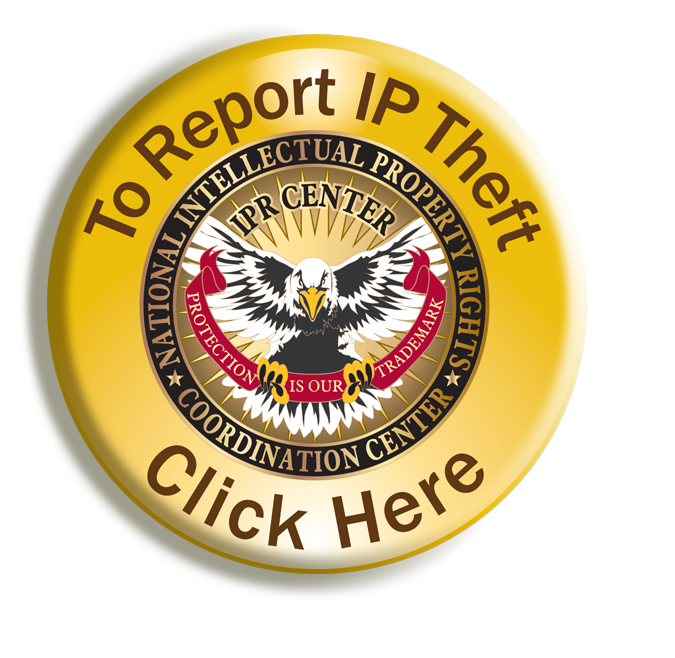Bruce Foucart
Director
National Intellectual Property Rights Coordination Center
Homeland Security Investigations
U.S. Immigration and Customs Enforcement
The National Intellectual Property Rights Coordination Center (IPR Center) sees collaboration as a key component to enforcing intellectual property (IP) rights. Led by U.S. Immigration and Customs Enforcement’s Homeland Security Investigations (ICE-HSI), and supported by 23 partner agencies, consisting of 19 U.S. agencies as well as INTERPOL, EUROPOL, and law enforcement from Mexico and Canada 1 the IPR Center seeks to ensure national security by protecting the public’s health and safety as well as the U.S. economy and the “war fighter” from individuals attempting to sell counterfeit goods.
The IPR Center accomplishes its mission through a multi-layered approach. This includes investigations to identify and dismantle criminal organizations; interdiction through targeting and inspections to keep illegal goods out of the U.S. supply chain; and outreach and training with domestic and international law enforcement to strengthen capabilities worldwide.
Collaboration among the IPR Center and its partners, including ICE-HSI, U.S. Customs and Border Protection, Federal Bureau of Investigation, Food and Drug Administration and rights holders contributed to more than 28,000 seizures worth an estimated $1.35 billion made in fiscal year 2015 (October 2014-September 2015). Still, there is room for enhanced collaboration that would allow U.S. law enforcement to react to cases referred from industry more quickly and efficiently.
U.S. law-enforcement agencies are dealing with limited resources while being tasked with increased responsibilities. The preliminary work brand-protection personnel conduct to prepare lead information is absolutely invaluable, but there is no standard detailing what data should be included in these referral packets.
In order to more effectively assist law enforcement, the IPR Center recommends providing a one-page report with appropriate documents that summarizes the concern. Supporting documentation should include
- Health and safety statements, loss of estimated revenue, relevant public safety issues, a timeline of events starting from the first encounter, and the identification of the subject and counterfeit products.
- Copies of all documents and electronic communication with the subject, reports of investigations, emails, Cease-and-Desist letters, prior CBP Fine, Penalties and Forfeiture notices, and civil court documentation.
- Open-source research conducted, including the identification of social media network presence and brick and mortar locations.
- Any test-purchase information and pictures, including test-purchase payment and shipping intelligence.
- Lab or authentication reports for confirmation of counterfeit, and victim or safety impact statements.
The IPR Center recently made it easier to provide this information through our website, IPRCenter.gov, through the “Report IP Theft” button. Rights holders can display this– widget on their websites to allow exploited consumers to report counterfeiting directly to the IPR Center. Information provided through this referral process is reviewed by IPR Center personnel at the National Cyber-Forensics & Training Alliance in Pittsburgh. The information is shared with industry and law enforcement, and a referral may be developed in order to launch an investigation. With the help of industry representatives in the pharmaceutical sector, sporting associations, and the automotive sector, who all have adopted the button, the IPR Center has received thousands of leads, some of which have resulted in investigations and prosecution.
The U.S. government is not going to seize its way out of the counterfeiting problem. Only through collaboration with federal and international law enforcement, state and local police authorities and representatives from industry conducting consumer awareness campaigns, sharing intelligence and exchanging best practices can we start to tackle IP theft. Industry is on the front lines of IP enforcement. By working together with the IPR Center, firms can help crack down on individuals threatening the health and safety of consumers, negatively impacting the economy, and engaging in other forms of criminality.
1 The task-force structure enables the IPR Center to effectively leverage the resources, skills and authorities of each partner agency and provide a comprehensive response to traditional customs fraud and the trafficking of various types of contraband.
THE BRAND PROTECTION PROFESSIONAL |SEPTEMBER 2016 | VOLUME 1 NUMBER 1
2016 COPYRIGHT MICHIGAN STATE UNIVERSITY BOARD OF TRUSTEES

